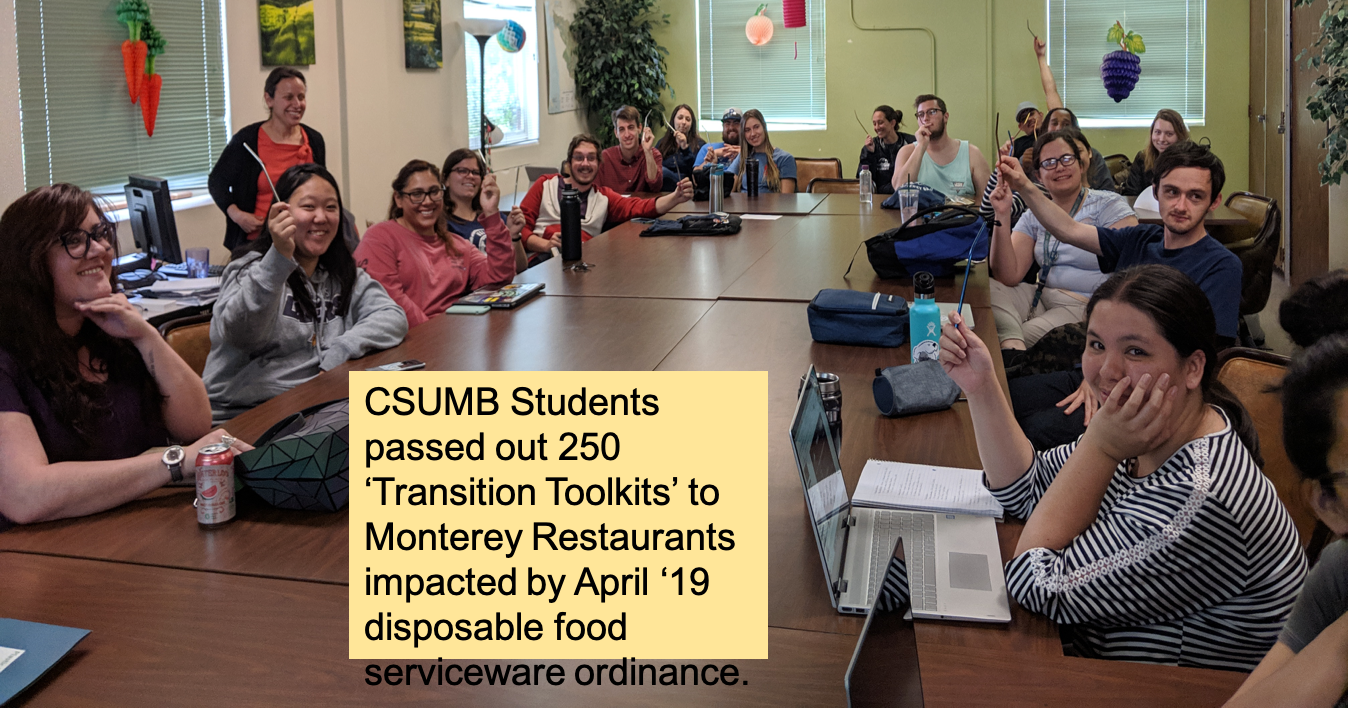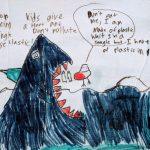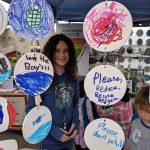STRATEGIES
Reducing the use of plastics requires focused strategies and plans to move to alternative products and practices in our consumer ecosystem. The Plastics Pollution Framework below shows ecosystem levels and roles in the life-cycle of single-use plastics production, packaging, sale, service, use and disposal. While most of single-use plastics have never been recyclable, many plastic bags and bottles are no longer recyclable due to the end of plastics recycling in China. The only way to stem the flow of plastic pollution is to eliminate their production and use or switch to non-plastic alternatives.

This framework is designed to scope and position projects of the community, organizations and students such as Capstone and Practicums. The higher the level of change in the eco-system, the greater the impact. Many national environmental organizations target the top levels. The focus of CSMC and partners is on levels 1-3 and 7 with the most influence on local community action and legislation. CSMC employs a ‘grounds-up’ strategy to educate the community and visitors on plastics’ environmental harm and to straightaway offer alternatives that are (a) conveniently available, (b) economically feasible (often needs to be free) and (c) “cool” or socially acceptable.
Current Projects and Activities
If you are interested in participating in any activities, please email sustainablemonterey@gmail.com.
ORDINANCE IMPLEMENTATION – ongoing in Monterey and Carmel
Plastic service-ware bans are only as effective as their compliance by impacted businesses. Information blitz, as conducted in by 40 volunteers visiting 250 restaurants in Monterey, needs follow-up by the community to ensure compliance. The cities of Monterey and Carmel are asking the community to inform them of food providers in non-compliance of their ordinances. Carmel businesses have had a year to comply and Monterey businesses have had 7 months. Monterey’s ordinance impacts 4X more than providers in Carmel, but their ban of plastic PLA straws makes it easy to recognize non-compliant straws. ..if it’s a plastic straw at all (including PLA) in Monterey, it is non-compliant.
Take Action:
- Familiarize yourself with the Carmel and Monterey plastic service-ware ordinances.
- Be prepared to inform the city of non-compliance to their representative.
- In Monterey, contact is Mallory Pankretz at pankretz@monterey.org
- In Carmel, contact is Agnes Martlet at amartelet@ci.carmel.ca.us
- When you ‘see something’ in Monterey or Carmel, then ‘say something’. Send an email to the city contact with the business’ name, location, date and non-compliant product seen.
OFFERING SUSTAINABLE SOLUTIONS
We are always on the lookout for how to deepen and expand ‘living without plastic’ practices and alternative products. Local shops offering reusable items to replace plastics include Eco-Carmel in Carmel, Lillify in Monterey, Bookworks in Pacific Grove. Some local action groups table at events and farmers markets to offer resuable items such as metal straws and cloth produce bags. PG’s Mondays farmers markets and Old Monterey Tuesday’s farmers markets host Sustainable Solutions tables through August and in Monterey.
Take Action:
- Volunteer to host a shift at farmers market; educate the public and offer reusable items and practices to replace single-use plastics.
- Implement a project in your class or club to create sustainable alternatives like beeswax wraps. Contact us for materials and support for such project
PAST PROJECTS
SPONSORED CLOTH PRODUCE BAGS
CSMC partnered with MRWMD in their rollout of recycling changes at farmers markets by offering (with small donation to cover costs) youth-decorated cloth produce bags (see past projects). From that program, we realized that the public’s habitual use of plastic produce bags requires non-plastic alternatives be as free and convenient as plastic bags are currently. So we initiated a program to ask businesses to sponsor cloth bags (via a tax-deductible donation to CSMC) that would, in return display their printed business name on the bag in sizes relative to their donated amount. The program, piloted in Pacific Grove and Seaside farmers markets was a highly successful win-win-win for farmers, environment, and the investing, supporting businesses.
CSMC thanks Matt Jolda, author of code that generates sponsor name cloud relative to donation amounts, Emily Hess, designer of the artwork for supporting organization and farmers/vendors, and Maureen Mason who secured sponsors within Sotheby’s Realtors in Pacific Grove.
Take Action:
- Volunteer for a program team to provide sponsored bags a farmers market in your area. This team will identify the no. of bags needed, the farmers/vendors recipients, secure target # of sponsorships, plan and communicate timing for donations, bag production, design approvals, receive & distribute bags.
- As a business, sign up to sponsor bags for your local farmers market. The optimal no. of community investor names in an image is 25 or more. Sponsors’ (tax-deductible) donations in our pilot ranged from $50 to $1000. If you are interested in being a sponsor, please contact us to let us know the local community in which you’d like to invest, and an estimated amount and timing for your donation.
PLASTICS COLLECTION IN PG
Through July and August, Sustainable Pacific Grove piloted a collections program for pre-determined plastic-based product waste items that are otherwise destined for landfills. Drop off bins were available at PG’s Everyone’s Harvest Farmers’ Market, Mondays 3:00-5:30 to collect the following (otherwise un-recyclable) plastic items. All materials were to be dry and free of product. See Items for Recycling for more details.
- Oral care waste such as toothpaste tubes, floss containers, toothbrushes. All brands.
- Razor blades, systems and their packaging. All brands.
- Arm & Hammer and OxiClean plastic pouches.
- Bausch & Lomb contact lenses and blister packs
- Plastic Bags and Film

Take Action:
- Visit whatgoeswhere.info to find a place near you to drop off plastic bags and wrap..
- Consider offering your resident business/organization as a permanent collection place for these items. CSMC and MRWMD will help promote and inform the public of your recycling service to the community. Contact MRWMD or CSMC to offer your resident business/organization as a Terracycle collection site.
MONTEREY CITY RESTAURANT OUTREACH
Sustainable Monterey partnered with other CSMC Local Action Groups, the City of Monterey, Save the Whales, Surfrider Foundation, Monterey Bay Aquarium to provide a toolkit for Food Providers to help support and ease their transition to comply with Monterey’s code update prohibiting
 single-use plastics in Monterey’s food services. This toolkit offers information, tips, best practices and resources to reduce single-use plastics in Monterey’s food service businesses. Click here to view the toolkit on Monterey’s ordinance.
single-use plastics in Monterey’s food services. This toolkit offers information, tips, best practices and resources to reduce single-use plastics in Monterey’s food service businesses. Click here to view the toolkit on Monterey’s ordinance.
YOUTH DECORATED CLOTH PRODUCE BAGS
Throughout last quarter of ’18, CSMC partnered with MRWMD in their farmers market outreach on plastic recycling changes to offer reusable cloth bags as a plastic alternative. To make the 5,000 organic cotton cloth bags “cool”, we invited students to decorate them with artwork and messages. Over 2000 students across Monterey County participated in the activity. Their messages were heartfelt and moving. The bags served as great wrapping paper and reminds owners of why and for whom they’re saving the planet when used.
PLASTIC POLLUTION EXHIBIT – Whalefest
CSMC has hosted an interactive Plastic Pollution exhibit at Whalefest for the last several years. The problem space of the exhibit educated visitors on the top polluting single-use plastics, their low recyclability, lifespan in the ocean and devastating impact to marine life.
Visitors marked a game card on what they can do to save marine life from plastics that kill. Since recycling is not an option for most single-use plastic items, the actions chosen to fight plastic pollution were to refuse, reuse or rescue from going into the ocean. After marking life-saving actions they can take, guests visited solution stations to learn more about plastic-alternative products and practices.
Students taught visitors about plastic alternatives and offering plastic-free living, the most common was to plan ahead and carry reusables. For pledges to adopt life-saving practices, visitors received a hand stamp and colored a disc to add to the ‘Curtain of Hope’ with one disc side of their favorite marine animal and on the other, the pledged action to save it.


